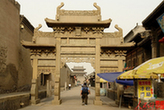a. Brief Introduction
An outstanding expression of the creative art of Chinese landscape garden design, incorporating the works of man and nature in a harmonious manner.
The Summer Palace is located in the north-western part of Beijing. First built in 1750, largely destroyed in the war of 1860, and restored on its original foundation in 1886, it served four generations of the imperial family, and is now a popular resort of people from all walks of life.
The Chinese name for the Summer Palace is Yiheyuan, "The Garden of Harmonious Unity". The palace is an outstanding example of imperial parks and private gardens with features of both northern and southern China, and is the best preserved and largest of the Chinese imperial parks. As a masterpiece of Chinese landscape garden design, it integrates the natural landscape of hills and open water with manmade features such as pavilions, halls, palaces, temples and bridges into a harmonious and aesthetically exceptional whole.
The Summer Palace covers an area of 290 ha, 3/4 of it being water. The present design gives prominence to Longevity Hill (Wanshoushan) and Kunming Lake. The garden is divided into three sectors: the official sector, the private sector and the landscape sector.
The official sector, or imperial palaces are in the eastern part of the Summer Palace. The main structures in this area include the Hall of Benevolence and Longevity (Renshoudian), also known as the Hall of Industrious Government (Qinzhengdian), its side halls and offices of ministers. The private sector is composed of three large courtyards, focusing respectively on the Hall of Jade Ripples (Yulantang), the Hall of Happiness and Longevity (Leshoutang) and the Yiba Hall. The landscape sector, the major part of the park, consists of Longevity Hill, Kunming Lake and a great variety of wooden, stone, glaze and brass structures.





Why not rent a boyfriend, or girlfriend to please parents during the Spring Festival?